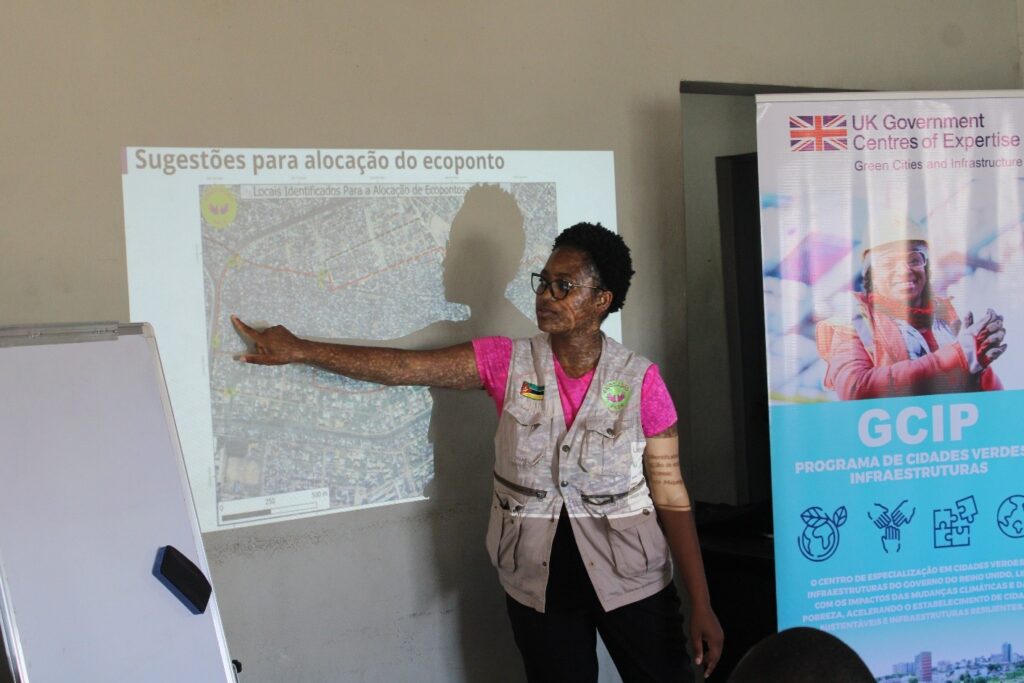- GCIP, in partnership with the FACE Association, establishes a Solid Waste Management Committee in the Macurungo-Miquejo neighbourhood in Beira, Mozambique.
- Influential community members, including youth, women, elderly people and people with disabilities, are part of the committee to improve solid waste management in the neighbourhood.
- Through the committee, strategic locations will be identified for the installation of eco-points, to promote recycling and foster a circular economy, providing economic opportunities and reducing the environmental impact of waste.

The new committee discusses suggestions for eco-point locations in Macurungo-Miquejo.
The Solid Waste Management Committee has been established in the Macurungo-Miquejo neighbourhood as part of GCIP's support to promote and develop Beira’s Local Adaptation Plan. Its primary goal is to implement sustainable solutions for solid waste management, improving environmental conditions and community well-being.
Like many other neighbourhoods in Beira, Macurungo-Miquejo faces critical challenges in managing solid waste. The improper disposal of waste negatively impacts essential infrastructure such as drainage systems and access roads, while also posing risks to public health and the environment. The creation of the committee strengthens community participation in waste management, promoting recycling and fostering a circular economy. Additionally, the introduction of eco-points will enable residents, including waste collectors, to sell recyclable materials such as plastics, bottles and metals, generating income and enhancing sustainability. This initiative not only reduces the environmental impact of waste but also encourages a cultural shift towards material reuse, alleviating pressure on urban infrastructure, particularly on drainage systems.
Beyond environmental concerns, Beira neighbourhoods also struggle with a lack of economic opportunities, which disproportionately impact young people and women, limiting their participation in the local economy. The establishment of the committee and the implementation of eco-points create an opportunity to engage these groups in waste collection and recycling activities, allowing them to benefit from the sale of recyclable materials. By improving waste management, this initiative also provides alternative income sources for vulnerable populations, contributing to the community's social and economic development.
To ensure inclusive participation and to assess impact, capacity-building initiatives will be monitored with data by gender, people with disabilities and micro or small businesses, fostering equitable opportunities for all members of the community.
Looking ahead, the next step is the installation of eco-points for the collection and sale of solid waste, followed by recycling, which will be managed by the FACE Association. This initiative is expected to significantly reduce waste accumulation in drainage systems and access roads, with an estimated reduction of at least 12 tonnes per year. Additionally, it will boost the local economy by creating new opportunities for marginalised families, providing them with an alternative source of income through waste collection and resale. It is estimated that individuals participating in this initiative could collectively earn over 250,000 MZN per year from recyclable materials.
The creation of the Solid Waste Management Committee represents a major step forward in addressing waste challenges. It aligns with GCIP’s objective of promoting and developing Beira’s Local Adaptation Plan by providing the community with a structured and recognised platform to discuss and implement solutions for waste-related issues. By strengthening local engagement, the committee enhances the neighbourhood’s capacity to address environmental concerns, ultimately improving the quality of life for residents, particularly those most vulnerable to the impacts of poor waste management.
The UK’s Green Cities and Infrastructure Programme is tackling climate change and extreme poverty by accelerating the delivery of sustainable green cities and climate-resilient infrastructure.
Published
11/03/25
